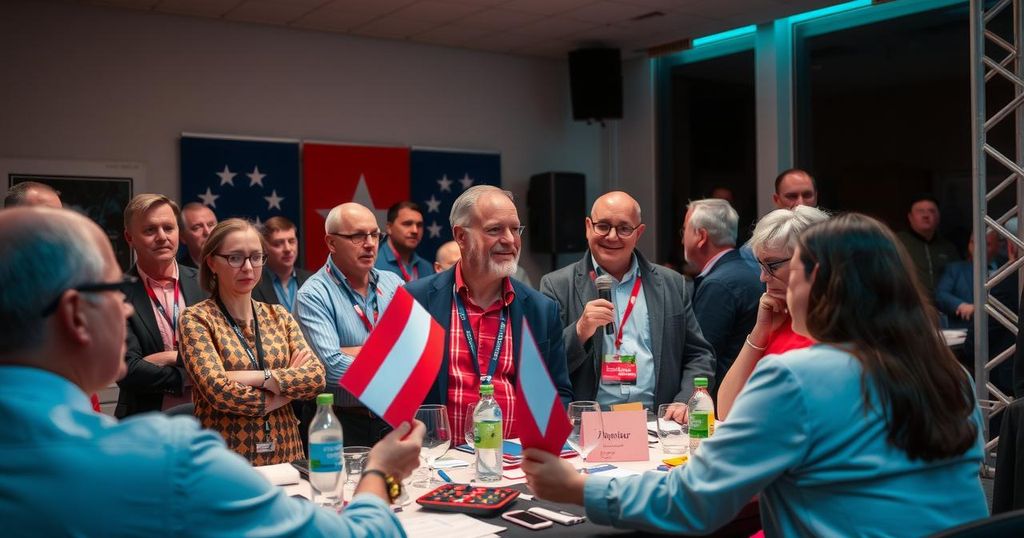Magdeburg Attack Sparks Political Tensions Ahead of German Elections

The attack at the Magdeburg Christmas market has sparked immediate disinformation and political exploitation by the far-right AfD, who aim to shift the electoral narrative towards security and anti-migration sentiments. With federal elections approaching in February, the incident is expected to influence discussions on domestic security while sidelining broader migration issues. Criticism of government officials and involvement of foreign entities add complexity to the political landscape as parties prepare for the upcoming election.
On December 23, 2024, the political ramifications of the tragic attack at the Magdeburg Christmas market are already unfolding, as misinformation and politicization arise in the aftermath. Initially, false narratives claimed multiple attackers, outlandish weaponry, and dubious links to refugee status, with far-right figures like Austrian nationalist Martin Sellner perpetuating these inaccuracies. Notably, the suspect, identified as Talib A.*, a Saudi citizen opposed to Islam and sympathetic to the Alternative for Germany (AfD), has ignited intense discourse regarding immigration and domestic security.
The AfD quickly attempted to leverage the situation, with party members blaming rival political parties for allowing such incidents. Statements from AfD representatives emphasize a strong anti-migration position as they seek to position their party as the guardian of national security ahead of federal elections scheduled for February. Political analysts are predicting heightened right-wing narratives to dominate the electoral landscape, displacing discussions on nuanced migration policies.
Calls for accountability have emerged, particularly directed towards the German Interior Minister Nancy Faeser regarding prior warnings about the suspect that were allegedly ignored. The rising trend of securitization in political discussions has led to migration being framed predominantly as a security concern while overshadowing the pressing need for skilled labor in the country. Amid heightened tensions, the six main political parties have established a fairness accord to avoid personal attacks during the campaigns, explicitly excluding the far-right AfD and the BSW from this agreement.
Furthermore, foreign influences, particularly from figures such as Elon Musk, known for his criticism of the German government, have added another layer of complexity to the political scenario. He has used the platform to amplify incendiary rhetoric against the German Chancellor, aggravating an already tense situation. Thus, the tragic events in Magdeburg are not merely a catalyst for mourning but a stark reminder of the election’s potential to reshape political dialogue in Germany.
The context surrounding the Magdeburg attack is steeped in rising xenophobia and anti-migration sentiments across Europe, particularly in Germany. This incident occurs against a backdrop of increasing right-wing rhetoric aimed at capitalizing on public fears regarding security and immigration. The January federal election is looming, with parties preemptively posturing to influence public sentiment in their favor. As political movements shift, events such as this attack frequently exacerbate already heated debates surrounding national security and immigration policy. Traditionally, parties like the CDU/CSU have championed domestic security issues, whereas the AfD seeks to highlight its role as a provocateur in debates regarding immigration. The increase in attacks and criticisms directed toward officials like the Interior Minister underscores the urgency and volatility of discussions in this pre-election environment. Furthermore, international figures and their involvement in national politics compound the complexities of the discourse.
The Magdeburg attack has ignited a political firestorm in Germany, prompting immediate efforts by far-right entities to manipulate the narrative for electoral advantage. As security becomes a primary talking point ahead of the February elections, the German political landscape is poised for a rightward shift, focusing heavily on migration as a security threat. This incident not only underscores existing societal fears but also illustrates the increasing influence of foreign authorities in domestic politics. It remains to be seen how these dynamics will evolve leading up to the elections and what lasting impacts they will have on German society.
Original Source: www.dw.com








